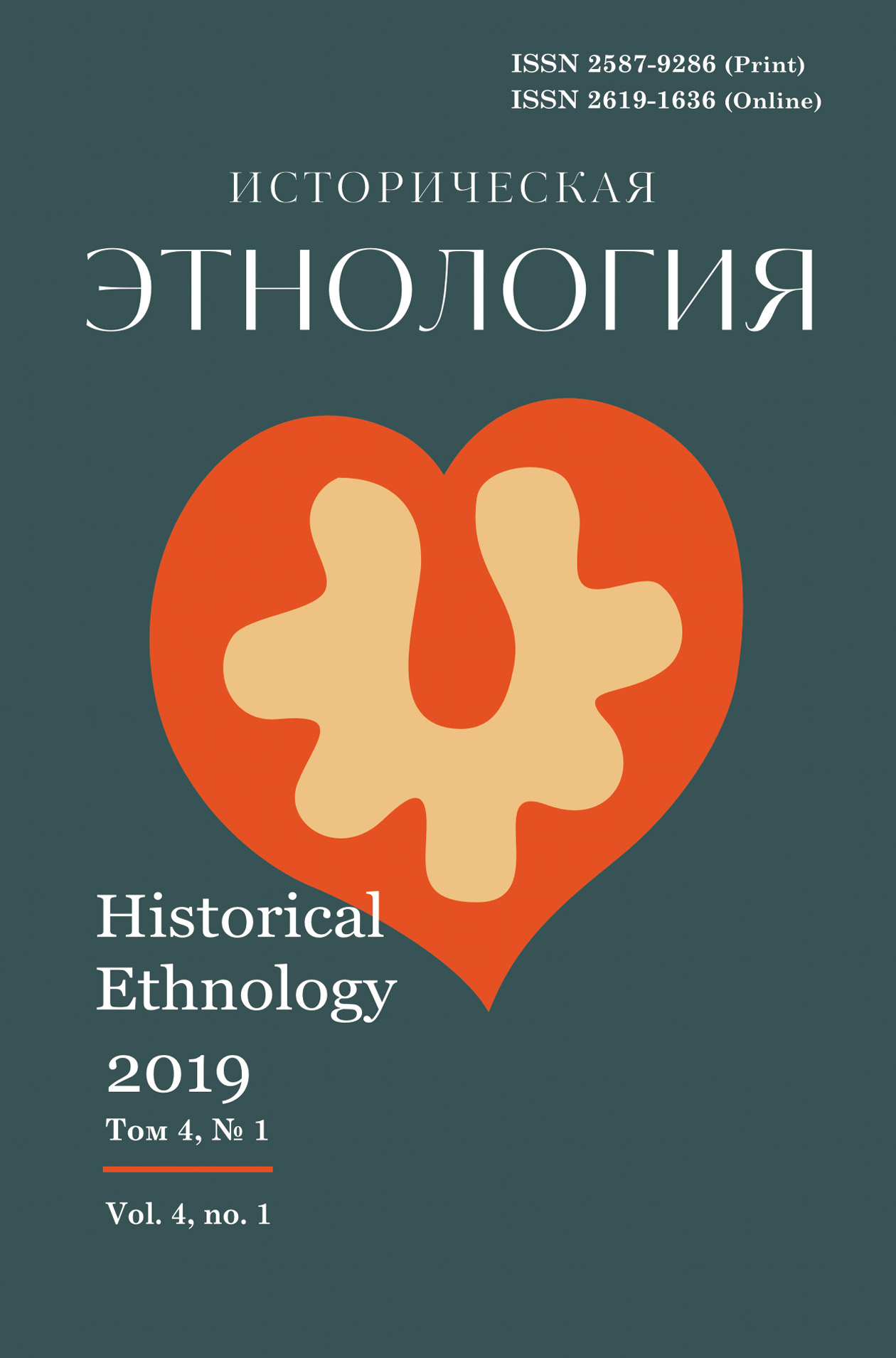Hajjilyk tradition in Gagauzes and other Balkan Christian peoples: historical context.
Kvilinkova E.N.
132-150 p.
doi.org: 10.22378/he.2019-4-1.132-150
The article examines the religious and ethnocultural phenomenon among the Ga-gauz people known as hajjilyk – pilgrimage to Jerusalem for the worship of the Holy Sepulcher. This tradition, which is one of the oldest forms of worship among the Chris-tians, has been preserved within the Gagauzes for many centuries without any change. The motives for this pilgrimage are based on the religious beliefs about the necessity of labor for the sake of God. It was considered the greatest of all kinds of pilgrimage and was therefore perceived as a spiritual feat. Based on the study of the historical forms of this phenomenon and the analysis of functions and codes of ritual practice the author came to the conclusion that, for a number of reasons, the hajjilyk differs significantly from all other forms of Orthodox pilgrimage. The purpose of its commission was not just spiritual renewal, but the complete rebirth of a person by performing a series of initial rituals (worship of the Holy Sepulcher, bathing in the Jordan River, perceived as a rite of washing away all sins, obtaining the title hajji and etc.). The unique combination of these components made the pilgrimage to Jerusalem a symbol of the Orthodox faith and a lifelong dream for the Gagauzes, who had the necessary resources and inner aspiration. Its characteristic feature is the fact that it was common among ordinary people. An integral part of this religious tradition were the farewell and welcome-home rituals by the whole village community, which “inscribed” it into the traditional culture and contributed to its preservation. Pilgrimage to the Holy Land (Christian East) is an important part of Orthodox cul-ture and the traditional outlook of the Gagauzes. This phenomenon penetrated all spheres of people’s livelihood and was a part of their religious and ethnocultural identi-ty. This tradition was interrupted with the outbreak of the First World War and was lost in the Soviet period and at present it is gradually being revived.
Keywords: Orthodox Christian piligrimagem Gagauzes, Balkan peoples, hajj, hajjilyk, hajji, religious identity
For citation: Kvilinkova E.N. Hajjilyk tradition in Gagauzes and other Balkan Christian peoples: historical context. Istoricheskaya etnologiya – Historical Ethnology, 2019, vol. 4, no. 1, pp. 132–150. DOI: 10.22378/he.2019-4-1.132-150
REFERENCES
- Babkin A.V. Spetsialnye vidy turizma [Special types of tourism]. Available at: http://tourlib.net/books_tourism/babkin03.htm (accessed 21.05.2016). (In Russian)
- Bolgarsko-russkiy slovar / sost. S.B. Bernshteyn. [Bulgarian-Russian Dictionary / compiled by S.B. Bernstein]. Moscow, 1953. (In Russian)
- Georgiev B. Khadzhiya, khadzhilk [Hajji, hajjilyk]. Khorizont. February 2, 2004. Available at: http://www.slovo.bg/showwork.php3?auid=52&workid=13144 &level=2 (accessed 28.07.2016). (In Bulgarian)
- Grammatikov P.Y. Za tsrkovnite otlichiya i oproshchavaneto na grekhovete [On church honors and forgiveness of sins]. Yelektronen vestnik Siyanie – Electronic Bulletin Shine. Br. 126. 2003. Available at: http://novosianie.com/?p=21634 (accessed 25.05.2016). (In Bulgarian)
- Gyurova S., Danova N. Km istoriyata na blgarskiya khadzhilk [On the History of the Bulgarian Hajjilyk].. Kniga za blgarskite khadzhii [The Book of a Bulgarian Hajji]. Sofiya, Marin Drinov Publ., 1995, pp. 7–28. (In Bulgarian)
- Yermolin D.S. Pravoslavnoe khadzhiystvo: palomnichestvo «zadunayskikh» kolonistov Budzhaka i Priazovya v Ierusalim v XIX – nachale XX v. (po materialam polevykh zapisey i veshchevykh kollektsiy MAE) [Orthodox Christian Hajji: Pilgrimage of the “Danube” colonists of Budjak and the Azov Sea to Jerusalem in the 19th – early 20th centuries (based on the materials of field records and ware collections of MAE)]. Radlovskiy sbornik: Nauchnye issledovaniya i muzeynye proekty MAE RAN v 2012 g. / Otv. red. Yu.K. Chistov [Radlov Collection: Research works and museum projects of MAE RAS in 2012 / Ed, Yu.K. Chistov]. St. Petersburg, MAE RAS Publ., 2013, pp. 393–399. Available at: http://www.kunstkamera.ru/files/lib/978-5-88431-238-8/978-5-88431-238-8_54.pdf (accessed 20.03.2015). (In Russian)
- Zhitenev S. Yu. Russkoe pravoslavnoe palomnichestvo v Ierusalim v X–XVI vv. [Russian Orthodox Christian Pilgrimage to Jerusalem in the 10th–16th centuries]. Doklad na Mezhdunar. nauchno-obshchestv. konf. «Ierusalim v russkoy dukhovnoy traditsii». Ierusalim. 1 noyabrya 2005 goda. Traditsii russkogo palomnichestva. Iz istorii stanovleniya palomnicheskikh traditsiy. [A report at the international conference “Jerusalem in the Russian religious tradition”. Jerusalem. Nov.1 2005. Traditions of the Russian pilgrimage. From the history of establishiment of pilgrimage traditions]. Available at: http://palomnic.org/heritages/history/first/gitenev/ (accessed 25.08.2016). (In Russian)
- Zhitenev S. Yu. Religioznoe palomnichestvo v khristianstve, buddizme i musulmanstve: sotsiokulturnye, kommunikatsionnye i tsivilizatsionnye aspekty [Religious pilgrimage in Christianity, Buddhism and Islam: Socio-cultural, communication and civilization aspects]. Moscow: Indrik Publ., 2012. (In Russian)
- Zhitenev S. Yu. Palomnichestvo kak religioznoe nasledie (Chast 2) [Pilgrimage as religious heritage (Part 2)]. Zhurnal instituta naslediya – Heritage Institute Journal. Issue 2. 2015. Available at: https://cyberleninka.ru/article/n/palomnichestvo-kak-religioznoe-nasledie-chast-2 (accessed 25.05.2016). (In Russian)
- Kvilinkova Ye.N. Gagauzy Moldovy i Bolgarii (Sravnitelnoe issledovanie kalendarnoy obryadnosti, terminov rodstva i folklora) [Gagauzes of Moldova and Bulgaria (Comparative study of calendar rituals, kinship and folklore terms)]. Kishinev, Pontos Publ., 2005. 308 p. (In Russian)
- Kvilinkova Ye.N. Traditsionnaya dukhovnaya kultura gagauzov: etnoregionalnye osobennosti [Traditional spiritual culture of Gagauzes: Ethnoregional features]. Kishinev, Buziness-Elita Publ., 2007. 840 p. (In Russian)
- Kvilinkova Ye.N. Zagovory, magiya i oberegi v narodnoy meditsine gagauzov [Conspiracies, magic and charms in traditional medicine of Gagauzes]. Kishinev, Elan Inc. Publ., 2010. 390 p. (In Russian)
- Kvilinkova Ye.N. Gagauzskiy pesennyy folklor – «Grammatika zhizni» [Gagauz song folklore – «The Grammar of Life»]. Kishinev, Elan Inc. Publ., 2011. 568 p. (In Russian)
- Kvilinkova Ye.N. Apokrify v zerkale narodnoy kultury gagauzov [Apocrypha in the mirror of the Gagauz folk culture]. Kishinev-Blagoevgrad, Tip. Centrală Publ., 2012. 600 p. (In Russian)
- Kvilinkova Ye.N. Pravoslavie – sterzhen gagauzskoy etnichnosti [Orthodoxy – the core of Gagauz ethnicity]. Komrat-Sofiya, Tip. Centrală Publ., 2013. 872 p. (In Russian)
- Kvilinkova Ye.N. Kult volka u gagauzov skvoz prizmu etnokulturnykh simvolov [The cult of the wolf of Gagauzes through the prism of ethnocultural symbols]. Kishinev, Tip. Centrală Publ., 2014. 472 p. (In Russian)
- Kvilinkova Ye.N. Kurban u gagauzov (Arkhaicheskaya sovremennost) [Kurban of Gagauzes (Archaic Modernity)]. Kishinev, Tip. Centrală Publ., 2015. 488 p. (In Russian)
- Kvilinkova Ye.N. Gagauzy v etnokulturnom prostranstve Moldovy (Narodnaya kultura i etnicheskoe samosoznanie gagauzov skvoz prizmu svyazi vremen) [Gagauzes in the ethnocultural space of Moldova (Folk culture and ethnic identity of the Gagauz people through the prism of continuity)]. Kishinev, Tipogr. Centrală Publ., 2016. 732 p. (In Russian)
- Kvilinkova Ye.N. Khadzhylyk u gagauzov kak religioznyy i etnokulturnyy fenomen: ot proshlogo k nastoyashchemu [Hajjilyk of Gagauzes as a religious and ethnocultural phenomenon: From the past to the present]. Kishinev, Tipogr. Centrală Publ., 2017. 424 p. (In Russian)
- Kniga za blgarskite khadzhii [The Book of a Bulgarian Hajji]. 2nd edition. Sofiya, Marin Drinov Publ., 1995. (In Bulgarian)
- Koch S.V., Samaritaki Ye.S. Greki [The Greeks]. Budzhak: istoriko-etnograficheskie ocherki narodov yugo-zapadnykh rayonov Odesshchiny [Budzhak: Historical-ethnigraphic essays on the peoples of Odessa south-western regions]. Odessa, SMIL Publ., 2014, pp. 329–388. (In Russian)
- Madzharov P. Bayaniya i zaklinaniya v repertoara na edna nositelka na folklor ot iztochniya dyal na Strandzha [Deodorant and spells in the repertoire of a publisher of folklore from the eastern part of Strandja]. Blgarski folklor (BF), 1978, no. 1, pp. 50–56. (In Bulgarian)
- Moshkov V.A. Gagauzy Benderskogo uezda. Etnograficheskie ocherki i materialy [Gagauzes of Bendery County. Ethnographic essays and materials]. Etnograficheskoe obozrenie – Ethnographic Review. 1901, no.4, pp. 1–80 (Reprinted abridged. Kishinev, Tipog. Centrală Publ., 2004. 494 p.) (In Russian)
- Moshkov V.A. Narechiya bessarabskikh gagauzov [Adverbs of the Bessarabian Gagauz]. Obraztsy narodnoy literatury tyurkskikh plemen. izd. V. Radlovym. Ch. X. [Examples of folk literature of Turkic tribes published by V. Radlov. Part 10]. St. Petersburg, 1904. (In Gagauz)
- Nikolov G.N. SSshayaka i krsta po trudnite ptishcha na blgarskiya dukh [With the shawk and the cross on the difficult paths of the Bulgarian spirit]. Available at: http://www.palitrabg.net/42gn.htm (accessed 25.05.2015).
- Podvizhniki-miryane [Hermits-Lay people]. Available at: http://romanbook. net/book/9957547/?page=34 (accessed 25.09.2016). (In Russian)
- Proiskhozhdenie grecheskikh familiy [The origin of Greek surnames]. Available at: http://lady.webnice.ru/blogs/?v=9898 (accessed 20.06.2016). (In Russian)
- Khadzhilkt – osznata potrebnost za edno svyato ptuvane [Hajjilyk – the conscious need for a holy journey]. 2002. Available at: http://www.dnevnik.bg/print/ arhiv_pari/2002/11/01/1550843_hadjilukut_-_osuznata_potrebnost_za_edno_sviato/ (accessed 20.06.2015). (In Bulgarian)
- Khadzhiya [Hajjiya]. 2014. Available at: https://www.standartnews.com/balgariya-obshtestvo/kod_hadzhiya-234476.html (accessed 20.02.2016). (In Bulgarian)
- Khadzh. [Hajj]. Available at: http://www.religio.ru/lecsicon/21/166_save_ photo_1010501589.html (accessed 25.01.2017). (In Russian)
- Khadzh – usloviya dlya soversheniya palomnichestva. [Hajj – conditions for pilgrimage]. Available at: https://ria.ru/spravka/20071217/92728403.html (accessed 25.01.2017). (In Russian)
- Khadzh [Hajj]. Entsiklopedicheskiy slovar F A. Brokgauza i I A. Yefrona [Encyclopedic dictionary of F.A. Brokgauz and I.A. Yefron]. St.-Petersburg, Brokgauz-Yefron Publ. 1890–1907. Available at: http://www.endic.ru/brokgause/Hadzh-34971.html (accessed 15.05.2017). (In Russian)
- Khadzhi [Hajji]. Entsiklopedicheskiy slovar F.A. Brokgauza i I.A. Yefrona [Encyclopedic dictionary of F.A. Brokgauz and I.A. Yefron]. St.-Petersburg, Brokgauz-Yefron Publ., 1890–1907, Available at: http://www.endic.ru/brokgause/Hadzhi-34972.html (accessed 15.03.2017). (In Russian)
- Ciachir M. Dicţionar gagauzo (tiurco)-român pentru gagauzii din Basarabia [Gagauz (Turkic)-Roman Dictionary for Gagauzes in Basarabia]. Chişinău, 1938. 134 p. (In Gagauz)
- Çakir M. (Ay Boba) Gagauzlar: istoria, adetlär, dil hem din [Gagauzes: History, traditions, language and religion]. Chişinău, Pontos Publ., 2007. 218 p. (In Gagauz)
- Dex online. Available at: https://dexonline.ro/lexem/hagi/167439 (accessed 20.02.2016). (In Romanian)
- [Elektronnyy resurs]. Available at: http://dic.academic.ru/ (accessed 20.02.2016). (In Russian)
- [Elektronnyy resurs]. Available at: http://dic.academic.ru/dic.nsf/hist_dic/ 14294 (accessed 20.02.2016). (In Russian)
- [Elektronnyy resurs]. Available at: http://endic.ru/fwords/Hadzhi-39433.html (accessed 20.02.2016). (In Russian)
- [Elektronnyy resurs]. Available at: http://www.endic.ru/islam/Hadzh-716.html (accessed 20.02.2016). (In Russian)
- [Elektronnyy resurs]. Available at: http://www.vehi.net/brokgauz/ (accessed 20.02.2016). (In Russian)
- [Elektronnyy resurs]. Available at: www.dveri.bg/content/view/10162/171/ (accessed 20.02.2016). (In Bulgarian)
About the author: Elizaveta N. Kvilinkova is a Doctor Habilitat of History, Research Associate Professor, the Center of Ethnology, Institute of Cultural Heritage of the Ministry of Education, Culture and Science of The Republic of Moldova (6/4, Decebal Avenue, Chisinau, The Republic of Moldova); cvilincova@mail.ru
|
|








